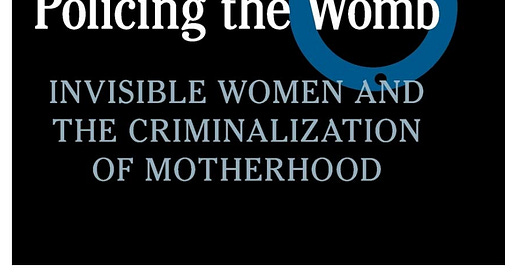Reproductive Justice and Race in South Carolina
Why it matters that the woman arrested in Greenville is Black
Since breaking last week, the story of the arrest of a Greenville woman for self-managing an abortion has gone viral, garnering national and international media attention. Susan Rinkunas at Jezebel reports that the woman is Black, a fact we can’t separate from the history of the treatment of Black women in the U.S. healthcare system (remember that medical staff recorded and reported that she took the medication). A recent New York Times story documents how, regardless of class status, maternal and infant mortality are higher for Black people by a significant margin.
South Carolina’s treatment of Black pregnant women is rooted in racist conceptualizations of Black motherhood and cannot be separated from the history of slavery, eugenics and forced sterilization. In the 1980s and 1990s, pregnant women at MUSC were drug tested without their consent and arrested in a dragnet operation run by state prosecutor Charles Condon with the willing participation of medical staff. Although drug use rates are similar among Black and white women, most of the women charged in the operation were Black. As Michelle Goodwin writes in Policing the Womb, Condon felt he needed more ways to encourage women to follow healthy habits, he needed a “‘real and very strong stick” (16-17). This prosecution lead to the arrest and separation of women from their newborns, sometimes in shackles and chains immediately after giving birth. In 1999, Regina McKnight was sentenced in South Carolina to twenty years in prison for her miscarriage because she tested positive for drugs. She served nearly a decade in prison before the state Supreme Court overturned her conviction (16).
These are women serving time not for seeking an abortion but for supposedly endangering a fetus. It’s happening throughout the country, and has increased in scope and number of women prosecuted since 1986, but especially in the last ten years. As Goodwin writes: “… to be pregnant and poor in the United States is to play a game of roulette with one’s privacy, presumed confidential relationship with medical providers, and basic constitutional and medical rights. Christine Taylor discovered this after falling down steps in her Iowa home. A trip and fall resulted in her arrest while returning home from the hospital. Taylor was jailed for attempted feticide” (15). Currently 38 states have feticide statutes, up from zero in 1986 (15). A heartbreaking documentary just released from Vice and The Marshall Project covers some of these women’s stories, as Jessica Valenti shared in Abortion, Everyday.
“… to be pregnant and poor in the United States is to play a game of roulette with one’s privacy, presumed confidential relationship with medical providers, and basic constitutional and medical rights.”
Abortion bans and feticide laws are part of a larger network of laws that disproportionately affect poor women and women of color. Even anti-abortion groups in South Carolina agree that self-managed abortion bans that criminalize women need to come off the books, as The Post and Courier reports. I recommend following and supporting the work of Pregnancy Justice (formerly the National Advocates for Pregnant Woman). As Goodwin reminds us, we have to approach the issue of abortion bans from a broader paradigm of advocating for the rights of all pregnant people, whether they choose to remain pregnant or not.
When I sent out the newsletter last week, some readers were surprised to learn that South Carolina criminalizes self-managed abortions. Although some states, when they first enacted anti-abortion statutes in the 19th century, provided that women could not be prosecuted, in South Carolina women have been criminalized since 1883, when the first anti-abortion law (in section three of the Act) subjected pregnant people to punishment if they obtained an abortion or attempted one. The current code dates from 1962.
These laws do nothing but hurt people and their families. Many of the women imprisoned have other children, so these laws created to supposedly solve the problems of abortion and child endangerment further harm children by taking away a parent, not to mention the harm caused to the person imprisoned. The framework of pregnancy justice is one possible avenue to invite anti-abortion groups to the fight. Governments should be working to make it possible for women and children to thrive, not criminalizing pregnant people.
From Pregnancy Justice:






Apparently, another instance of 'heritage, not hate!"